In the spring of 1966, Lyndon Johnson became the first United States president to visit New Zealand when he touched down at RNZAF Station Ohakea on October 19 with the primary aim of bolstering support for the Vietnam War. Appearing at a luncheon at Parliament House later in the day, tens of thousands of enthusiastic Wellingtonians vastly outnumbered anti-war protestors.
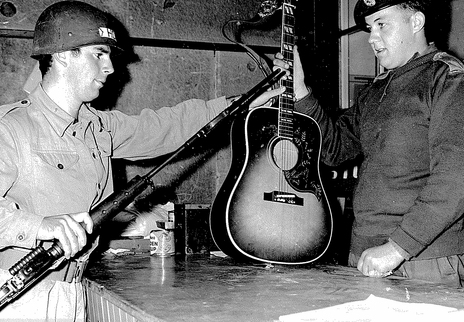
John Hore joins the army, 1966 - Redmer Yska Collection
Departing New Zealand for the States on the same day was the nation’s premier country music artist John Grenell, having completed compulsory military training, to play shows and chase an American record deal. Then known as John Hore, his second LP, Encore, had outsold the latest releases from The Beatles in New Zealand during 1965.
Grenell used his middle name to construct the stage name John Denver while in the US, where he was a backstage guest at the Grand Ole Opry in Nashville, appeared on TV, recorded with Dean Martin’s arranger, and held down several residencies, including one with The Mitchell Trio that featured another young man who had recently changed his name to John Denver and would enjoy great international success just a few years later.
Working on an H-1 visa commonly applied to musicians and artists, Grenell was granted two extensions but was told by the US Immigration and Naturalization Service that they wanted him out of the country by mid-April 1967. However, they were prepared to let him stay and continue working if he registered for the US draft and took his chances with being shipped to Vietnam; an offer he declined.
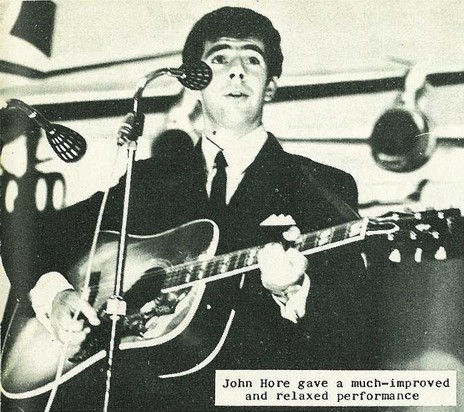
John Hore in concert - Nelson Photo News, 1965
In March 1967, New Zealand’s Country & Western Spotlight newsletter published a letter Grenell penned to his friend Garth Gibson, the periodical’s editor, in which he regaled readers with tales of meeting country stars Merle Haggard, Johnny Cash, Connie Smith and others, appearing with his favourite, Marty Robbins, and being backed by luminary musicians such as pedal-steel guitarist Red Rhodes, as well as guitarist Jimmy Bryant and soon-to-be-superstar Glen Campbell.
Grenell was called up by ballot in September 1965 to undertake compulsory military training in the NZ Army. Although his manager Joe Brown thought of appealing for deferment, Grenell, then 21, felt it was better to be finished with it as soon as possible. Later that month, Brown met with Hollywood Bowl director Stephen Papich in Auckland to discuss his charge working in America.
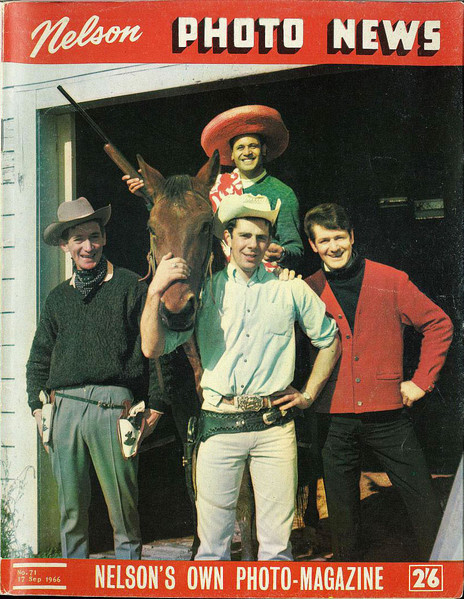
John Hore Grenell, pictured in Nelson just prior to his first visit to the US. From left: Paul Walden, John Hore and Peter Posa; on the horse is "Senor" Howard Morrison. - Nelson Photo News, 17 September 1966.
With his army training done, John Grenell gave a farewell performance in a Brown presentation at the Theatre Royal in Christchurch in September 1966, as part of a tour with Peter Posa, Paul Walden and Howard Morrison. The Press reported: “A bevy of uninhibited young women perched precariously in one of the boxes persuaded Mr Hore to sing one of his most popular hit songs, ‘My Voice Keeps Changing On Me’.”
The article also announced that the singer would be known as John Denver while working in the United States. One theory was that his stepfather’s surname, Hore, invited negative connotations for an American audience in its closeness to the word “whore”. Later in New Zealand he would be known as John Denver Hore and John Hore Grenell before taking his birth name John Grenell.
But back in 1966 he was winging his way across the Pacific with Joe Brown. “I left NZ on October 19th,” Grenell wrote to Garth Gibson, “flew Air New Zealand to Honolulu and then on to Los Angeles, arriving in LA four hours before I left NZ (work that out!).”
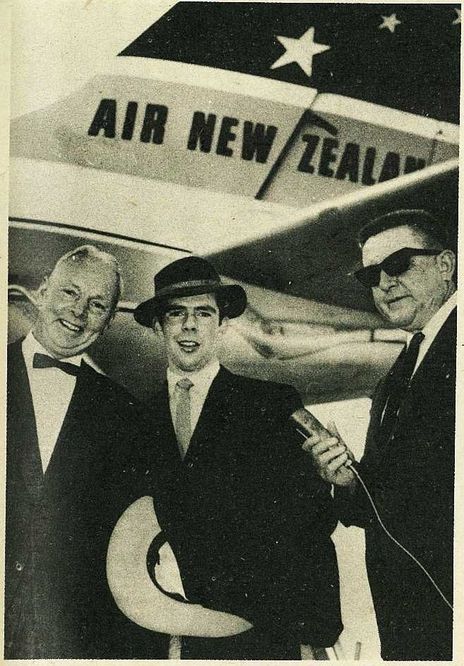
Joe Brown and John Hore arrive in Los Angeles, 1966. The interviewer at right is Bob Ferris, of Hollywood's KNX.CBS. - Gisborne Photo News
Greeted by Stephen Papich and Hollywood theatrical agent Buddy Goldberg, Grenell was interviewed by KNX.CBS Hollywood reporter Bob Ferris for broadcast on his radio show that evening. Grenell and Brown stayed overnight at “Singing Cowboy” Gene Autry’s Hotel Continental on the Sunset Strip before flying to Nashville for the Country Music Disc Jockey Convention and the 41st birthday celebrations of WSM radio show Grand Ole Opry.
Their attendance at the Nashville event was arranged by Country Music Association executive director Jo Walker-Meador. When the CMA was founded in 1958, Walker-Meador was hired as office manager. The next year, she organised an Opry birthday banquet and awards programme that turned into an annual event soon known as CMA Week. In 1962, she became the first executive director of the CMA and one of the first women to head a music organisation.
“Everyone I met in Nashville wanted to hear of New Zealand and the C&W scene down under”
“Everyone I met in Nashville was very friendly and all wanted to hear of New Zealand and the C&W scene down under,” Grenell wrote in his letter. “During my four-day stay in Nashville, Mr Brown and myself made the most of everything. I think we talked to and interviewed on tape just about everybody who was in town for the convention.”
On October 21, Grenell and Brown were special backstage guests of WSM promotion manager Bill Williams at the Grand Ole Opry, where Grenell met and spoke with Hank Snow, Johnny Cash, Carl Smith, Skeeter Davis, Connie Smith, Dottie West, cowboy tailor Nudie Cohn, and more. The pair were also interviewed on WSM by country pioneer Tex Ritter.
The next day they attended the RCA Records breakfast and show before lunching with Mary Reeves Davis, the widow of country star Jim Reeves. “A wonderful person who told us of the many letters she receives from New Zealand regarding her late husband’s career.” More than two decades later, Grenell would have a New Zealand No.1 with Reeves’s ‘Welcome To Our World’ and tour in a Reeves tribute show.
That evening, Grenell had a long conversation with Ray Price at the Columbia Records show, then met and interviewed Buck Owens, Merle Haggard and Sonny James at the Capitol Records reception and show. Owens’s ‘Open Your Heart’ was the current No.1 on the Billboard Hot Country Singles chart, while Haggard’s ‘Swinging Doors’ would end up the best-selling country single of the year.
Grenell and Brown were guests of Capitol A&R man and Haggard producer Ken Nelson, “who later on, back in Los Angeles, cut a demonstration record with me. A gentleman who thoroughly knows the business.”
Following that, it was the late Saturday night Opry show where Bill Williams didn’t hesitate in escorting Grenell and Brown across the Ryman Auditorium stage while the show was in progress to introduce them to anyone he considered worthy of meeting. Then the evening, and the Music City leg, was wound up with supper at the legendary Tootsies Orchid Lounge on Broadway.
“We sure were sorry to have to leave Nashville but will be back in 1967 for the convention and, I hope, to guest on the Opry and other celebration shows,” wrote Grenell. However it would be nine years before Grenell appeared at CMA Week again, at the International Show during the Opry’s 50th birthday.
His first gig in the States was at the folk-oriented Troubadour in West Hollywood where he was booked as John Denver for a two-week residency with The Mitchell Trio. He became friends with them and was impressed by the music of their songwriter John Denver, who had recently changed his name from Henry John Deutschendorf Jr after it was suggested that “Deutschendorf” would not fit easily on a marquee.
The American’s songs would resonate with Grenell long into his career. He recorded Denver’s ‘Sweet Surrender’, ‘Back Home Again’, ‘One World’ and a reworking of ‘Whispering Jesse’ on his 1970s, 1980s and 1990s albums as well as writing his own ‘Windstar – Aotearoa’ in dedication to the environmental education organisation Windstar Foundation, co-founded by Denver in 1976.
General Artists Corporation took care of Grenell’s Stateside bookings and publicity as well as filing petitions with the immigration office to extend his stay. “I congratulate them for the progress they made on behalf of myself, an unknown ‘country singer from down under’,” Grenell wrote. “Also, I’d like to let you and the readers know that my manager Mr Joe Brown has been exceptional, and I can’t thank him enough for what he has done for this US project and for me back home.”
During Christmas, Grenell spent a fortnight in Denver, Colorado, skiing during the day and singing at the Mountain Tourist Resort at night. “With 18 inches of snow I won’t forget my first white Christmas. I met holidaying people from all over the world, Kiwis and all.” One such holidaymaker was Mercury Seven astronaut Scott Carpenter, who was in the audience one night and requested the recent pop song ‘Born Free’.
“With 18 inches of snow I won’t forget my first white Christmas”
Among the other clubs John Grenell appeared at were the Palomino in North Hollywood, three times, alongside his favourite artist Marty Robbins, honky tonk singer Skeets McDonald, Johnny and Jonie Mosby, and Australians The LeGarde Twins, and an Australasian show with the LeGardes at the Golden Embers in Rialto, California.
For the Palomino shows Grenell was backed by session man Red Rhodes and The Detours, while The LeGarde Twins’ band, The Boomerangs, provided backing at the Golden Embers. At other club gigs, the musicians included early Telecaster adopter Jimmy Bryant, and Wrecking Crew guitarist and stopgap Beach Boy Glen Campbell, who would find “overnight success” a few months later with his singles ‘Gentle On My Mind’ and ‘By The Time I Get To Phoenix’.
“I had a good yarn to Marty and his band, and Don Winters and Bobby Sykes,” wrote Grenell. “They still talk about their visit to New Zealand and ask after everybody and send their regards. I was pleased to find that I played many of the spots that Peter Posa played when he was here, and everyone really praised his playing; he left a fine impression.”
Grenell fulfilled a week-long stand at the Matador Room of the Buena Vista Hotel at Safford, Arizona, at which time he took some rodeo roping lessons at the weekly Sheriff’s Posse club. He returned to the Matador for his final US appearances for a week at the end of March.
As well as appearing on the national The Dating Game and other TV shows in San Diego and Mexico, Grenell revealed he had scored a US recording deal. “I’ve signed a contract with a new label, Champion, which is a C&W label,” he wrote. “Through Mr Brown’s efforts I’m the first artist signed and will have options over others on material, etc.
“The record business is fickle here. Capitol and [Capitol subsidiary] Tower Records were interested in signing me up. I would have liked to; they are a top label. But they also have many top well-known artists such as Buck Owens, Sonny James, Merle Haggard, who, as you and I know, get the preference over material, publicity, etc.
“As I can see the business over here, there are many fine artists and live performers ‘on the shelf’, signed to a company. A lot of thought went into a recording deal over here, and Mr Brown and myself took the track we thought best, but I guess only time will tell.”
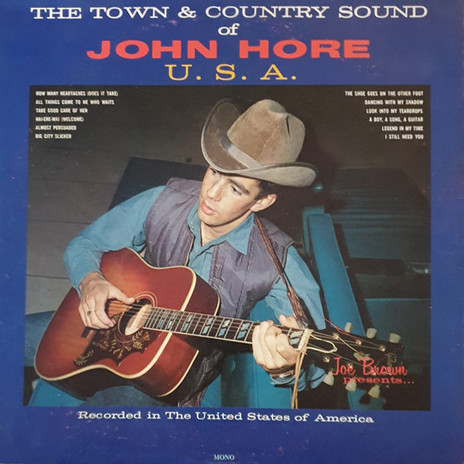
The Town & Country Sound Of John Hore U.S.A. (Joe Brown, 1966)
An album was recorded in Hollywood with production supervisor Buddy Landon and arranger-conductor Ernie Freeman, who had worked with Dean Martin, Frank Sinatra and Petula Clark. Released on the Joe Brown label in New Zealand, The Town & Country Sound of John Hore USA was released on the Cadet label in the States.
It’s unclear what became of the Champion deal or indeed the label, but Grenell wrote that during his five-week stand there Champion had taped one of his shows at The Ice House in Pasadena, California, “which they may release here, but which will be released in New Zealand on the Joe Brown label”.
Upon completing his second stint at the Matador Room, Grenell returned home in time to headline the Miss New Zealand Show tour in April. “The immigration people here are tough and want me out of the country by April 15. They told me I could stay and work longer if I was prepared to register for the draft. This army business seems to like me. Before I could leave New Zealand, I had to fulfil national service training, but that’s life.” He signed the letter: “Kind regards, John Denver Hore.”
‘Almost Persuaded’, recorded by John Hore Grenell in Hollywood, 1967